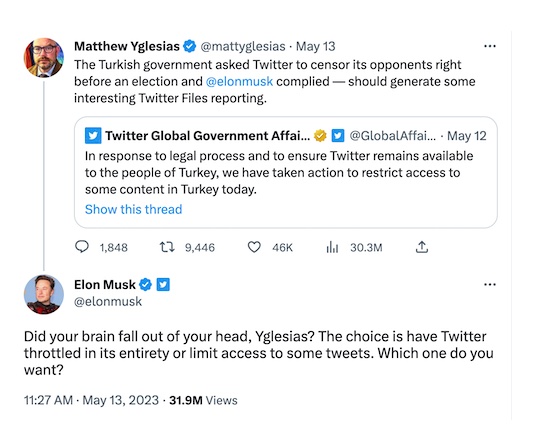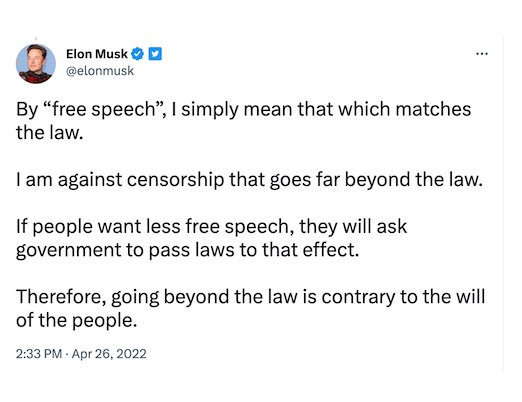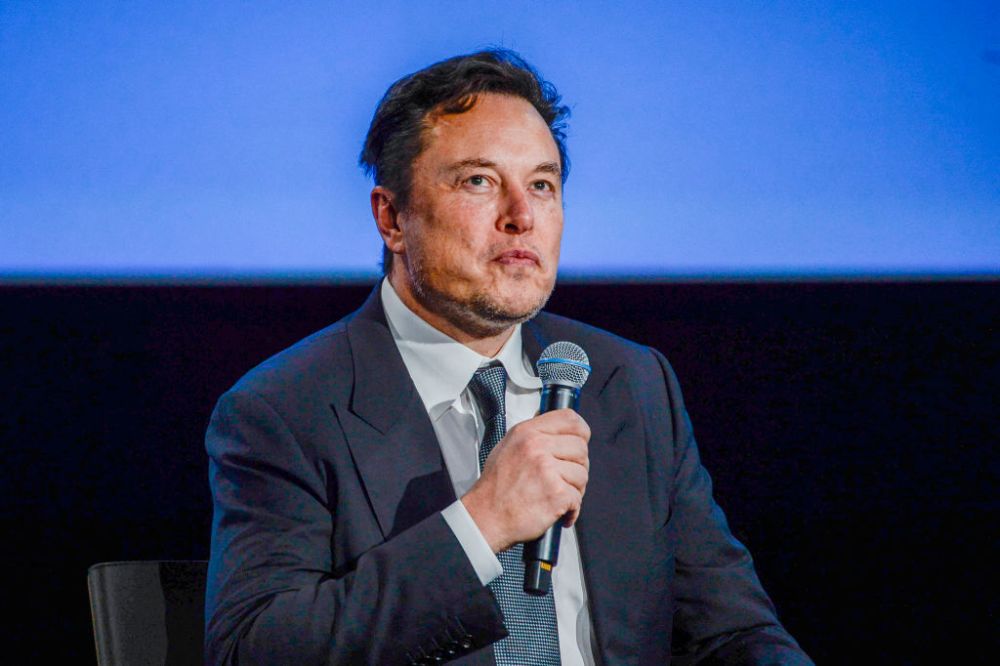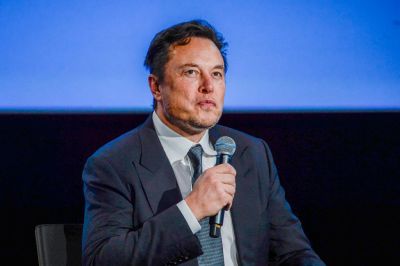To use Twitter in the Elon Musk era is to be reminded daily of how fundamentally juvenile the new owner is. And to me, it’s a recurring surprise.
Those who have followed his career closely will roll their eyes at that. Being surprised at Elon’s adolescent sensibility in 2023 is like being surprised at Donald Trump’s narcissism. It’s his defining trait. If you’re only now noticing it, you clearly haven’t paid him a lick of attention.
And it’s true, I hadn’t until he bought Twitter. I knew him as the world’s richest man and the head of two paradigm-shifting companies. It didn’t occur to me that someone so capable could be so immature.
And now everyone’s rolling their eyes at my naïveté.
Musk seems to channel most of his juvenile impulses into meme-ing on his Twitter account, not very effectively. I’ve been guilty of that myself in the past but (a) I had the good sense to quit and (b) I don’t have two paradigm-shifting companies competing for my attention. Still, if he’s determined to behave like a 14-year-old, posing as an edgelord tryhard on social media is about as benign a way to do it as I can think of.
There are less benign ways, of which Musk is also guilty.
He’s as credulous about the information he consumes online as any 14-year-old is.
Like an especially self-absorbed 14-year-old, he’s perpetually starved for attention and prone to throwing tantrums when he doesn’t get it.
He lashes out petulantly and at times self-destructively at his enemies instead of pausing to weigh the consequences of his actions, just like a … well, you know.
This weekend brought striking new evidence of another way in which Musk behaves like a teenager: He’s stridently self-righteous about political matters to which he hasn’t devoted a moment of serious thought.
Elon Musk purchased Twitter because he cares deeply about freedom of speech and wanted to use his wealth to protect it. It was an act of pure altruism.
Or so he says. I’ve always suspected that he bought Twitter because he grew so brain-poisoned by social media addiction over time that ultimately nothing short of owning his platform of choice would scratch his itch. He dreamed of becoming the Main Character and he had the wherewithal to make it happen.
Whatever the case may be, lord knows the purchase wasn’t a business decision.
Musk spoke arrestingly about free speech all last year, before and after acquiring the company. Last April, after he’d made his offer, he framed the stakes as existential. “This isn't a way to make money,” he told an interviewer. “My strong intuitive sense is that having a public platform that is maximally trusted and broadly inclusive is extremely important to the future of civilization.” In November, after he’d taken command and begun hyping the release of the so-called Twitter Files, he teased their release this way: “This is a battle for the future of civilization. If free speech is lost even in America, tyranny is all that lies ahead.”
On other occasions he’s described himself as a “free speech absolutist” and Twitter as “the de facto public town square,” warning that failing to follow “free speech principles” on the platform would undermine democracy itself.
He didn’t mean a word of it.
Or, to rephrase: He meant it only in the narrowest, most parochial, most self-interested way. Just like a 14-year-old might.
On Friday an account run by Twitter HQ made a meticulously vague announcement.
That was two days before Turkey’s presidential election, which took place Sunday. The authoritarian leader of that country, Recep Tayyip Erdoğan, faced a stiff challenge from the opposition. Suddenly and mysteriously, certain Twitter content was inaccessible to the Turkish public.
According to a Turkish news source, the accounts of a well-known businessman and an investigative journalist—both stridently anti-Erdoğan—went dark. The businessman had “previously shared shocking revelations about the Turkish government” and was teasing information that the failed 2016 coup attempt there was carried out with Erdoğan’s knowledge. The journalist, an expat, has an enormous following on YouTube and had vowed to expose any election fraud committed this weekend on Erdoğan’s behalf.
This wasn’t the first run-in Elon Musk’s Twitter had with the Turkish government in 2023. In February, after the country was shattered by an earthquake, the regime cut off all public access to the platform. “Turkey has established a clear pattern of throttling social media in times of crisis,” one activist complained at the time, suspecting that Erdogan wanted to short-circuit dissent at a moment of high public emotion. Access was reinstated after 12 hours, Foreign Policy reported, but “it remains unclear what conversations or decisions led to Twitter being restored.”
Based on how Musk behaved this weekend, we can now guess what those conversations were about.
It isn’t news that Elon Musk, free-speech absolutist, isn’t the absolutist he cracks himself up to be. Certainly not with respect to his employees, critics, and competitors, and increasingly not with respect to entities whom he seems to regard as ideological enemies. Last month FIRE cataloged the many ways he had fallen short of his rhetoric about free speech in his first six months of ownership, concluding that Twitter was less like a digital town square than a “house party” hosted by the owner.
But blacking out dissident accounts in Turkey felt shocking nonetheless. It’s one thing for Elon to suspend a teenager for posting the comings and goings of his private jet, it’s another for him to abet an authoritarian bid to cling to power by suppressing information on election day that might matter at the polls. That’s as total a perversion of his “democracy depends on free speech” moralizing as one can imagine.
When he was challenged on it, he responded like a 14-year-old. Not a bright one, either.

Begin with the tone. The fact that he leaped immediately to sneering at Yglesias, as if the ethical dilemma presented by Erdoğan’s demand was no dilemma at all, speaks volumes about how seriously Musk actually takes freedom of speech.
He didn’t just roll over for an autocrat. He rolled over and laughed at the thought that anyone might behave differently.
His company has reflected that moral intuition since he took over. According to Twitter’s own data, the platform received more orders and requests from governments to surveil or censor users in the first six months of Musk’s tenure than it did in the previous 12 months under prior management. Why? Probably because Musk has been far more likely to comply with those orders and requests than his predecessors were. Quote: “In the year before Musk's acquisition, the [compliance rate] had hovered around 50%, in line with the compliance rate reported in the company's final transparency report. After Musk's takeover, the number jumps to 83% (808 requests out of a total of 971).”
Ironically, before Musk, Twitter was known to compare favorably to other social media platforms in resisting attempts by authoritarian governments to muscle social media. Vijaya Gadde, the former top lawyer at the company, is a villain to the right for her role in suppressing the Hunter Biden laptop story before the 2020 election, but she fought hard abroad for freedom of speech. Including in Turkey, incidentally, where Twitter once prevailed over the Erdoğan regime in court.
Musk could have sued, as other prominent online platforms have. Or he could have stood on principle and dared Erdoğan to knock the platform offline on the eve of the election, letting him reap the backlash. “If Twitter were throttled in its entirety perhaps Turkish voters would better understand the authoritarian tendencies of their government and the costs it’s imposing on the nation as a whole,” said Jonah Goldberg, correctly.
Instead, by capitulating to Erdoğan, Musk invited oppressive regimes everywhere to bully him with censorship demands. All it takes to turn Twitter from a public town square on which the future of civilization depends, it seems, into a useful arm of an authoritarian state is threatening to ban the platform.
Hence Yglesias’ joke about the Twitter Files: If you take Elon Musk and his acolytes seriously, hidden government collusion with Twitter is exactly the sort of nightmare scenario they worry about. Now here it is happening in the open, on Musk’s watch and by his own admission, and his fans seem less bothered by his complicity than they do the fact that his new CEO is a “globalist” who also works for the World Economic Forum.
We shouldn’t take them seriously.
Many Musk critics have pointed out that he might have an ulterior motive in cooperating with Erdoğan, one that isn’t so common among 14-year-olds.
Two months ago Tesla received a license in Turkey to operate its expensive Supercharger Network there. The company had eyed expanding operations in the country for years and finally began to follow through last year. Musk and Erdoğan have been acquainted since 2017, in fact, and have done business before: In April Turkey’s first domestic satellite with sub-meter resolution was launched on a Falcon 9 rocket made by Elon Musk’s SpaceX. This past winter, at the World Cup, the two men shared a long handshake on camera.
In hindsight, the idea of the public town square on which civilization allegedly depends being owned by an amoral corporate magnate who does big business with every scumbag regime on Earth might have been flawed. A man willing to legitimize the Uyghur genocide by opening a showroom in Xinjiang probably isn’t the great savior of Western liberalism.
I don’t think Musk’s motives are wholly mercenary, though. I suspect he views the issue of free speech through the milky lens of the red-pilled subculture that he’s adopted and conducts himself accordingly. Take this infamous tweet from April 2022 in which he inadvertently warned us about his unseriousness on his pet issue.

Which “law”? And where does he get the idea that that “law” reflects “the will of the people”?
In the United States the First Amendment tends to thwart the will of the people on matters like prohibiting flag-burning or restricting pornography as often as it facilitates it. In Turkey the law is presumably much narrower in what it allows—and because the government is run by an authoritarian, the people may have great difficulty working their will to change it.
Musk had a chance to help them this weekend by refusing to cooperate in the suppression of disfavored speech. Had he done so, either the platform would have gone dark, outraging some Turkish voters, or Erdoğan would have capitulated and withdrawn his demand. Instead, Elon’s concept of free speech seems to be culturally dependent. What he’s willing to do to suppress speech in the United States is different from what he’s willing to do to suppress it in Turkey, an oddly morally relativistic view of free speech for a “free speech absolutist” to take.
One that’s destined to incentivize governments to be more restrictive about online speech, I should add.
But it’s in line with the right-wing populism with which Musk now identifies. The post-liberal right doesn’t concern itself with principles, it concerns itself with prerogatives. Trump himself gave a memorably nihilistic statement of that last week when he called for House Republicans to default on the national debt; when asked how he could say that after he railed against defaulting when he was in office, he said, “Because now I’m not president.”
There are no principles, only prerogatives. Elon Musk didn’t buy Twitter because he cared about free speech, he bought Twitter because he cared that the particular speech of his fan club of right-wing trolls wasn’t free enough to his liking on a platform infected by the, ahem, “woke mind virus.” Enemies of the regime here at home are protected; enemies of a foreign regime aren’t his concern.
And that’s his right. But we can all drop the pretense now that he had any grander aspirations about “free speech principles,” insofar as any pretense existed.
Intentionally or not, Musk’s moral relativism means that authoritarian opinions in free countries like the United States get a wide berth on Twitter while anti-authoritarian opinions in authoritarian countries get a narrow one. And maybe it is intentional: It’s hard to see why Musk chose to remove the labels on Twitter accounts run by media outlets identifying them as “state-affiliated” or “government-funded” if not to make it harder to distinguish propaganda networks from reliable sources.
He’s making the world safe—or safer—for illiberalism and bad information, enough so that I wonder if he’ll eventually be in touch with Beijing about ending the years-long ban on Twitter there in exchange for whichever constraints on content moderation they desire. Like Yglesias, I look forward to the Twitter Files reporting on this.







Please note that we at The Dispatch hold ourselves, our work, and our commenters to a higher standard than other places on the internet. We welcome comments that foster genuine debate or discussion—including comments critical of us or our work—but responses that include ad hominem attacks on fellow Dispatch members or are intended to stoke fear and anger may be moderated.
With your membership, you only have the ability to comment on The Morning Dispatch articles. Consider upgrading to join the conversation everywhere.